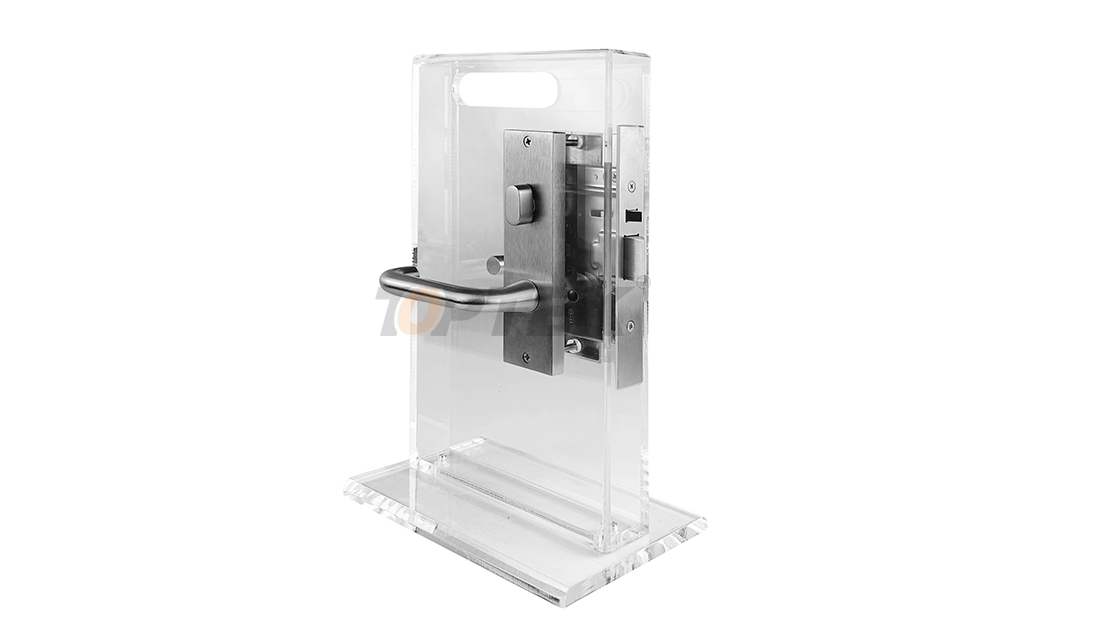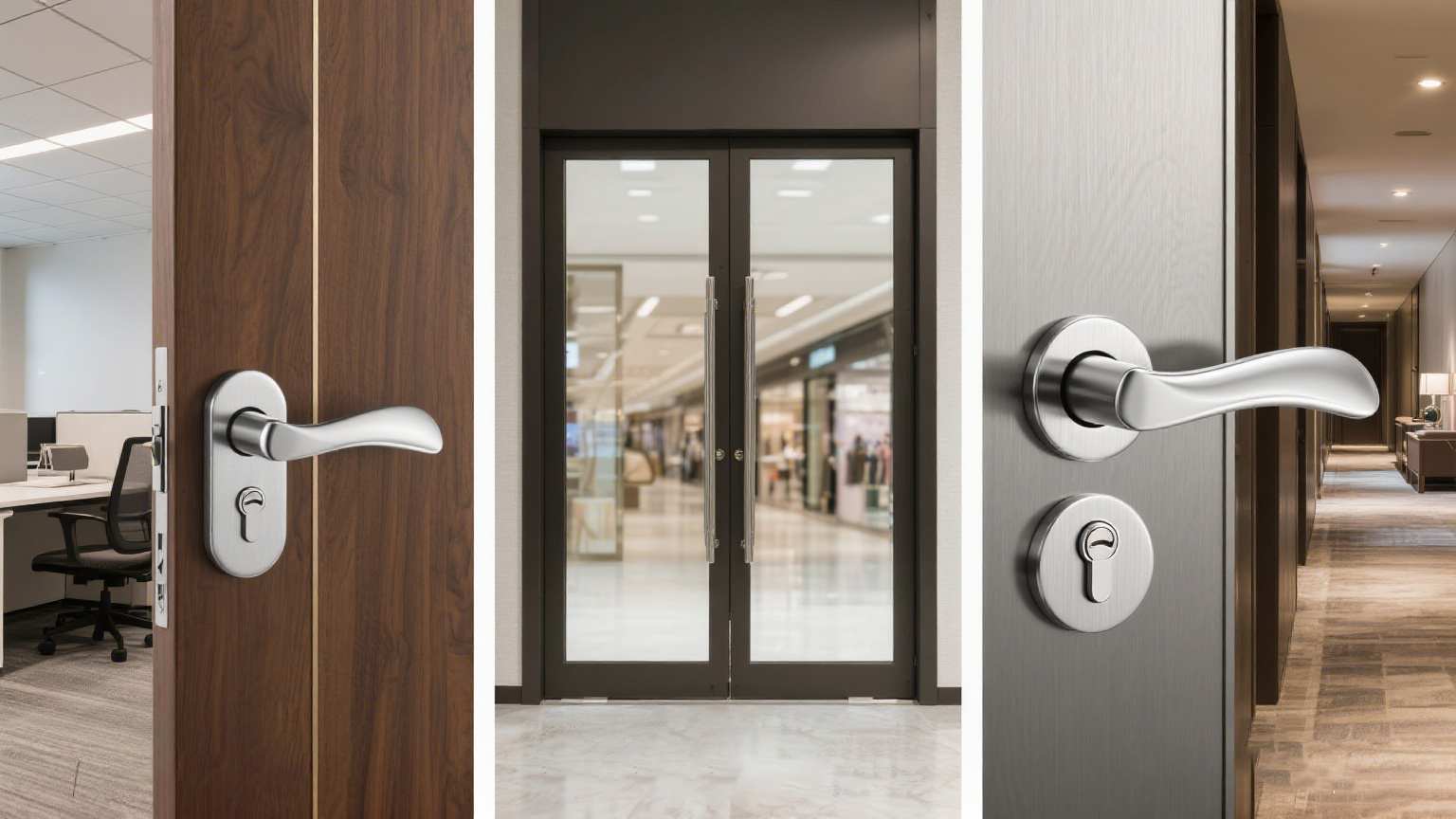When it comes to protecting your business premises, choosing the right commercial lock isn't just about keeping doors closed. It's about safeguarding assets, ensuring employee safety, and maintaining peace of mind when you're off-site.
Australian businesses face unique security challenges, from high-traffic retail environments to warehouses and office complexes. An AU commercial lock needs to withstand heavy use, resist tampering, and comply with local building codes and insurance requirements.
This guide will walk you through everything you need to know about commercial locks in Australia, helping you make informed decisions that protect your business effectively.
Understanding AU Commercial Lock Standards
Australia has specific standards and regulations governing commercial security hardware. The Australian Standard AS 4145 sets the benchmark for quality and performance of commercial locks, ensuring they meet minimum security requirements.
Key compliance considerations:
· Fire safety regulations: Commercial locks must allow emergency egress while maintaining security
· Disability access: Locks should comply with AS 1428 accessibility standards
· Insurance requirements: Many insurers specify minimum security grades for coverage
· Building code compliance: Local councils may have additional requirements
Before investing in any commercial locking system, verify it meets relevant Australian standards. This protects you legally and ensures your insurance remains valid.

Types of AU Commercial Locks
Different business environments require different locking solutions. Here's a breakdown of the most common types used across Australia.
Mortice Locks
Mortice locks are installed within the door itself, making them highly secure and tamper-resistant. They're the gold standard for Australian commercial properties, particularly for external doors.
These locks offer exceptional durability and are available in various security grades. Higher-grade mortice locks feature anti-drill plates, hardened steel components, and pick-resistant mechanisms.
Cylindrical Locks
Cylindrical locks are easier to install and replace than mortice locks, making them popular for internal doors and lower-security applications. They're installed through two holes drilled in the door and secured with a mounting plate.
While less secure than mortice locks for external use, quality cylindrical locks still provide adequate protection for interior spaces, storage rooms, and office doors.
Electronic Access Control Systems
Modern businesses increasingly rely on electronic access control rather than traditional keys. These systems use keycards, PIN codes, or biometric readers to grant entry.
Benefits include:
· No need to rekey when staff leave
· Detailed audit trails of who enters when
· Remote access management
· Integration with alarm systems
· Flexible access scheduling
Electronic systems require professional installation and ongoing maintenance, but the convenience and security benefits often justify the investment.
Panic Hardware
Also known as crash bars or exit devices, panic hardware is mandatory for many commercial buildings under the Building Code of Australia. These allow quick exit during emergencies while maintaining security when properly configured.
Panic hardware must be installed on doors leading to fire exits, stairwells, and any door used by more than 50 people. They can be combined with alarms to prevent unauthorized use during normal operations.
Choosing the Right Australia Commercial Lock
Selecting appropriate commercial locks depends on several factors specific to your business and location.
Assess Your Security Needs
Start by conducting a security audit. Which areas require the highest protection? What are your main vulnerabilities? Consider factors like location, crime rates in your area, value of inventory, and whether you handle cash.
External doors, cash offices, and equipment storage areas typically need the highest-grade locks. Interior doors between lower-risk areas can use standard commercial-grade hardware.
Consider Traffic and Usage
High-traffic doors need commercial locks built for thousands of daily operations. Residential-grade hardware simply won't hold up in busy retail or office environments.
Look for locks rated for heavy-duty commercial use, with reinforced components and smooth operation even after years of service.
Master Key Systems
Many Australian businesses benefit from master key systems, which allow management to access all areas while restricting staff to specific zones.
A properly designed master key system provides flexibility and control. Work with a licensed locksmith to create a hierarchy that matches your organizational structure.
Climate Considerations
Australia's diverse climate means choosing locks appropriate for your environment. Coastal businesses need corrosion-resistant hardware, while properties in high-UV areas require fade-resistant finishes.
Stainless steel and marine-grade components perform well in harsh conditions. For extreme environments, consider specifying additional protective treatments.
Installation and Maintenance
Even the best AU commercial lock will underperform if poorly installed or maintained.
Professional Installation Matters
Commercial locks should always be installed by licensed, experienced locksmiths. Poor installation can compromise security, void warranties, and lead to premature failure.
Verify your locksmith holds appropriate Australian licenses and insurance. Request references from similar commercial projects.
Regular Maintenance Schedule
Implement a maintenance program to keep locks functioning smoothly:
· Lubricate moving parts every six months
· Check for loose mounting screws quarterly
· Clean lock faces and remove debris buildup
· Test electronic systems monthly
· Replace worn keys before they break
Regular maintenance extends lock life and prevents inconvenient failures during business hours.
Emergency Locksmith Relationships
Establish a relationship with a reliable commercial locksmith before you need emergency service. Lockouts, broken keys, and security breaches require immediate professional response.
Choose a locksmith offering 24/7 emergency service, mobile capabilities, and experience with your specific lock types.

Upgrading Your Commercial Security
Technology constantly evolves, and older locks may no longer provide adequate protection.
Consider upgrading if:
· Your locks are over 10 years old
· You've experienced security incidents
· Insurance requirements have changed
· You're implementing access control systems
· High staff turnover makes key control difficult
Modern commercial locks offer significantly improved security features, user convenience, and integration capabilities compared to older systems.
Why Quality Matters for Your Business
Cutting corners on commercial locks is false economy. Premium AU commercial locks from reputable manufacturers offer superior security, longer service life, and better warranty coverage.
Quality locks also maintain their operation under stress. When an emergency happens, you need hardware that functions reliably, whether that's allowing quick exit or preventing forced entry.
Insurance companies recognize quality too. Many offer premium discounts for properties with high-grade security hardware and professionally monitored systems.
Securing Your Business Future
Protecting your business with appropriate commercial locks is an investment in continuity and peace of mind. The right Australia commercial lock system balances security, functionality, and compliance while meeting your specific operational needs.
Take time to assess your requirements properly, consult with licensed professionals, and choose quality hardware that will serve your business reliably for years to come. Your premises, staff, and customers deserve nothing less than comprehensive protection.
AU Commercial Lock
Australia Commercial Lock
Commercial Door Hardware
English
العربية
Français
Русский
Español
Português
Deutsch
italiano
日本語
한국어
Nederlands
Tiếng Việt
ไทย
Polski
Türkçe
አማርኛ
ພາສາລາວ
ភាសាខ្មែរ
Bahasa Melayu
ဗမာစာ
தமிழ்
Filipino
Bahasa Indonesia
magyar
Română
Čeština
Монгол
қазақ
Српски
हिन्दी
فارسی
Kiswahili
Slovenčina
Slovenščina
Norsk
Svenska
українська
Ελληνικά
Suomi
Հայերեն
עברית
Latine
Dansk
اردو
Shqip
বাংলা
Hrvatski
Afrikaans
Gaeilge
Eesti keel
Māori
සිංහල
नेपाली
Oʻzbekcha
latviešu
অসমীয়া
Aymara
Azərbaycan dili
Bamanankan
Euskara
Беларуская мова
भोजपुरी
Bosanski
Български
Català
Cebuano
Corsu
ދިވެހި
डोग्रिड ने दी
Esperanto
Eʋegbe
Frysk
Galego
ქართული
guarani
ગુજરાતી
Kreyòl ayisyen
Hausa
ʻŌlelo Hawaiʻi
Hmoob
íslenska
Igbo
Ilocano
Basa Jawa
ಕನ್ನಡ
Kinyarwanda
गोंगेन हें नांव
Krio we dɛn kɔl Krio
Kurdî
Kurdî
Кыргызча
Lingala
Lietuvių
Oluganda
Lëtzebuergesch
Македонски
मैथिली
Malagasy
മലയാളം
Malti
मराठी
ꯃꯦꯇꯥꯏ (ꯃꯅꯤꯄꯨꯔꯤ) ꯴.
Mizo tawng
Chichewa
ଓଡ଼ିଆ
Afaan Oromoo
پښتو
ਪੰਜਾਬੀ
Runasimi
Gagana Samoa
संस्कृत
Gaelo Albannach
Sepeti
Sesotho
chiShona
سنڌي
Soomaali
Basa Sunda
Wikang Tagalog
Тоҷикӣ
Татарча
తెలుగు
ትግንያውያን
Xitsonga
Türkmençe
संस्कृत
ئۇيغۇرچە
Cymraeg
isiXhosa
ייִדיש
Yorùbá
isiZulu






































